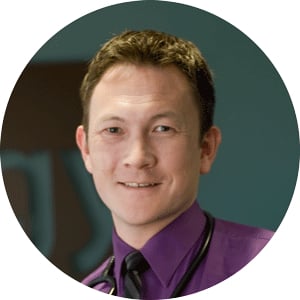
When your thyroid gland does not produce normal amounts of thyroid hormone, it will likely affect your metabolic rate and proper functioning of your endocrine system. Your thyroid gland is located near the middle of your neck and regulates energy utilization, produces proteins and modulates the reaction of the body to various other hormones.
Specifically, two hormones unique to the thyroid gland — thyroxine and triiodothyronine — are found lacking in people from suffering hypothyroidism. Most cases of hypothyroidism result from inflammation or autoimmune thyroiditis while iodine deficiency causes hypothyroidism in underdeveloped countries.
Hypothyroid Symptoms
Initial signs of early-stage hypothyroidism include:
- Headaches — when none had previously been experienced
- Reduced appetite but unusual weight gain
- Feeling tired all the time
- Inability to concentrate/memory problems
- Dry, flaky skin
- Menstrual problems
- Feeling colder than usual
- Experiencing early puberty — in children nine to 12 years of age
Early hypothyroid symptoms are typically subtle and do not interfere with daily activities. As a result, many people may not seek medical attention until the condition worsens. In addition, many of these symptoms are similar to normal aging complaints voiced by older people. A proper diagnosis may not be made until blood is tested for reduced thyroid hormones.
Advanced Hypothyroidism Signs
As levels of thyroid hormones thyroxine and triiodothyronine continue to drop, other symptoms may develop, such as:
- Depression
- Numbness, pain and weakness in muscles
- Arthritis-like problems in joints — swelling, inflammation
- Loss of hearing
- Voice change — deepening, huskiness
- Pale, extremely dry skin
- Hair and nails becomes brittle and coarse
- Hair loss
- Snoring/sleep apnea
- Obesity without an appetite
How Is Hypothyroidism Diagnosed?
Blood tests determine hypothyroidism by measuring levels of thyroid hormones in the blood as well as white blood cell count and other endocrine secretions. Treatment consists of taking medication daily for regulating thyroid hormone levels.
Other tests for hypothyroidism may be used when signs of hypothyroid are evident but blood tests are inconclusive. For instance, a biopsy, or the removal of a small amount of thyroid tissue, can be done as outpatient surgery. Often, biopsies are performed when a physician suspects cancer cells may be affecting the thyroid.
In addition, injecting radioactive dye into a patient and employing a thyroid scan can reveal how well the gland is working by illuminating areas of the thyroid that actively absorb the dye. A doctor may also issue thyroid ultrasound tests to examine the thyroid for functional deficiencies.
Hypothyroidism and Weight Gain
Because hypothyroidism slows down your metabolism, your body won’t burn calories as efficiently as it did before suffering thyroid disease. Anytime your body is stressed by a disease, whether it’s caused by malfunctioning organs or a pathogen, such as bacteria, viruses or fungi, this physical stress interferes with normal neurotransmitter activity.
Serotonin levels are especially affected when your body is stressed from disease, and serotonin is a neurotransmitter that is important for regulating appetite and sleep. While increasing serotonin tends to decrease appetite, decreased serotonin levels promotes hunger. When your thyroid is underperforming, your serotonin levels drop, causing you to feel hungry even if you don’t really need to eat.
If you are gaining weight, feel tired all the time and have other symptoms indicative of hyperthyroidism, please call Synergy Wellness at 661-878-9100 to schedule an appointment for an age management consultation.


